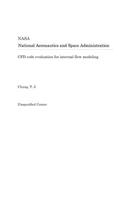
Cfd Code Evaluation for Internal Flow Modeling
Series:
Research on the computational fluid dynamics (CFD) code evaluation with emphasis on supercomputing in reacting flows is discussed. Advantages of unstructured grids, multigrids, adaptive methods, improved flow solvers, vector processing, parallel processing, and reduction of memory requirements are discussed. As examples, researchers include applications of supercomputing to reacting flow Navier-St
NaN
VOLUME
English
Paperback

Research on the computational fluid dynamics (CFD) code evaluation with emphasis on supercomputing in reacting flows is discussed. Advantages of unstructured grids, multigrids, adaptive methods, improved flow solvers, vector processing, parallel processing, and reduction of memory requirements are discussed. As examples, researchers include applications of supercomputing to reacting flow Navier-Stokes equations including shock waves and turbulence and combustion instability problems associated with solid and liquid propellants. Evaluation of codes developed by other organizations are not included. Instead, the basic criteria for accuracy and efficiency have been established, and some applications on rocket combustion have been made. Research toward an ultimate goal, the most accurate and efficient CFD code, is in progress and will continue for years to come. Chung, T. J. Unspecified Center...
Price Comparison [India]
In This Series
Bestseller Manga
Trending NEWS




















